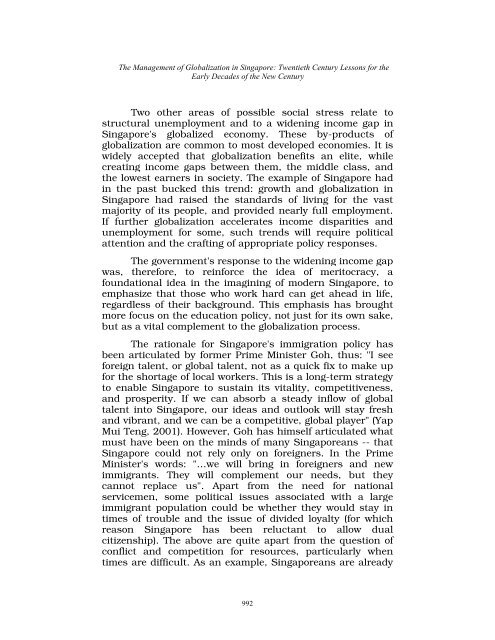The Management of Globalization in Singapore: Twentieth Century ...
The Management of Globalization in Singapore: Twentieth Century ...
The Management of Globalization in Singapore: Twentieth Century ...
You also want an ePaper? Increase the reach of your titles
YUMPU automatically turns print PDFs into web optimized ePapers that Google loves.
<strong>The</strong> <strong>Management</strong> <strong>of</strong> <strong>Globalization</strong> <strong>in</strong> S<strong>in</strong>gapore: <strong>Twentieth</strong> <strong>Century</strong> Lessons for theEarly Decades <strong>of</strong> the New <strong>Century</strong>Two other areas <strong>of</strong> possible social stress relate tostructural unemployment and to a widen<strong>in</strong>g <strong>in</strong>come gap <strong>in</strong>S<strong>in</strong>gapore's globalized economy. <strong>The</strong>se by-products <strong>of</strong>globalization are common to most developed economies. It iswidely accepted that globalization benefits an elite, whilecreat<strong>in</strong>g <strong>in</strong>come gaps between them, the middle class, andthe lowest earners <strong>in</strong> society. <strong>The</strong> example <strong>of</strong> S<strong>in</strong>gapore had<strong>in</strong> the past bucked this trend: growth and globalization <strong>in</strong>S<strong>in</strong>gapore had raised the standards <strong>of</strong> liv<strong>in</strong>g for the vastmajority <strong>of</strong> its people, and provided nearly full employment.If further globalization accelerates <strong>in</strong>come disparities andunemployment for some, such trends will require politicalattention and the craft<strong>in</strong>g <strong>of</strong> appropriate policy responses.<strong>The</strong> government's response to the widen<strong>in</strong>g <strong>in</strong>come gapwas, therefore, to re<strong>in</strong>force the idea <strong>of</strong> meritocracy, afoundational idea <strong>in</strong> the imag<strong>in</strong><strong>in</strong>g <strong>of</strong> modern S<strong>in</strong>gapore, toemphasize that those who work hard can get ahead <strong>in</strong> life,regardless <strong>of</strong> their background. This emphasis has broughtmore focus on the education policy, not just for its own sake,but as a vital complement to the globalization process.<strong>The</strong> rationale for S<strong>in</strong>gapore's immigration policy hasbeen articulated by former Prime M<strong>in</strong>ister Goh, thus: "I seeforeign talent, or global talent, not as a quick fix to make upfor the shortage <strong>of</strong> local workers. This is a long-term strategyto enable S<strong>in</strong>gapore to susta<strong>in</strong> its vitality, competitiveness,and prosperity. If we can absorb a steady <strong>in</strong>flow <strong>of</strong> globaltalent <strong>in</strong>to S<strong>in</strong>gapore, our ideas and outlook will stay freshand vibrant, and we can be a competitive, global player" (YapMui Teng, 2001). However, Goh has himself articulated whatmust have been on the m<strong>in</strong>ds <strong>of</strong> many S<strong>in</strong>gaporeans -- thatS<strong>in</strong>gapore could not rely only on foreigners. In the PrimeM<strong>in</strong>ister's words: "…we will br<strong>in</strong>g <strong>in</strong> foreigners and newimmigrants. <strong>The</strong>y will complement our needs, but theycannot replace us". Apart from the need for nationalservicemen, some political issues associated with a largeimmigrant population could be whether they would stay <strong>in</strong>times <strong>of</strong> trouble and the issue <strong>of</strong> divided loyalty (for whichreason S<strong>in</strong>gapore has been reluctant to allow dualcitizenship). <strong>The</strong> above are quite apart from the question <strong>of</strong>conflict and competition for resources, particularly whentimes are difficult. As an example, S<strong>in</strong>gaporeans are already992
















